InvisibleHandiwork
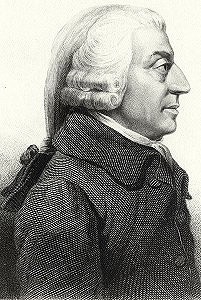
Adam Smith, Our Invisible Friend
"May we each come to more deeply appreciate our own agency."
The clever critic starts every review with some variant of, "Far be it from me to criticize, but …". That's a really BIG but, ingenuous as Hell, so I will allow myself to start this criticism more authentically. Your Invisible Friend continues betraying you. Your continuing faith in his underlying beneficence crosses the line between devotion and idolatry. Believe whatever you choose to believe, I say, but consider what each belief bestows upon thee. (I'm very likely to get preachy from here on, so proceed with care.) Any belief that continuously punishes your faith in it, ain't that great of a belief. Any faith that feeds cynicism should simply be abandoned. Any devotion that breeds a deepening sense of victimization, does damage rather than good. I know I'm not supposed to propose any hard shoulds, but please consider what your experience could become if you ditched your insidious Invisible Friend.
He has, they say, an invisible hand, one which, without human intervention, rules economic progress.
PursuingHappiness
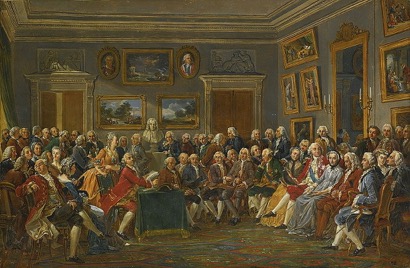
Reading of Voltaire's tragedy of the Orphan of China in the salon of Marie Thérèse Rodet Geoffrin, by Lemonnier. Circa 1812
"Could anyone find full satisfaction with that?"
The Age of Enlightenment eventually brought many improvements. Previous unspeakables became openly discussed. Rights of individuals came to be held as more sacred than the formerly presumed divine rights of either monarch or church, but at best I might fairly characterize that age as a lurch forward, for none of the resulting improvements came about easily. A couple centuries of brutal warfare has left us still divided, for both liberalism and its dedicated opposition emerged from those discussions, and the arguments continue perhaps in even greater earnest. Like all great movements, The Enlightenment was never advanced by particularly enlightened individuals. Assertions were made with little supporting evidence. Convictions encouraged every variety of pseudo certainty: prejudice, bigotry, misogyny, and racism thrived within The Enlightenment and, indeed, seem to continue thriving today, for The Movement could never produce the sorts of confident certainty divine rights might have bestowed. It represented a second order paradigm shift, trading extreme faith for continuing speculation and experimentation capable of approaching improvement but only by iterating, recognizing and adapting to error. All this performed by mere humans. It was and is quite the continuing speculation that it might succeed, and yet it did and has, though also didn't and has not. The path to anywhere from there seemed paved with the scientist's patient wariness, but few followers qualified as scientists.
We seem an impatient lot. We want what we want when we want it, not later, and enlightenment demands patience above all.
Publickity

Entry of John II of France and Joan I of Auvergne into Paris after their coronation at Reims in 1350,
later manuscript illumination by Jean Fouquet
"Notice how I'm not promising a glowing experience or to potentially change your life …"
Today's the day! I find myself suddenly NowHere after a couple of years' preparation, ready to more publicly display my creation in an act of Publickity, by which I mean not an act of publicity intended to gin up notoriety, but a slightly broader sharing. Few have seen my most recent works, though I have more than a dozen in various stages of final completion. A book goes through many completions, an initial one followed by several subsequent ones, each accompanied by its own sense of doneness, all but the final one ultimately false but nonetheless rewarding. There's always one more pass needed: editing, sequencing, re-editing, fine-tuning, the list extends well into a small infinity. Even the final, final, final, final version carries considerable uncertainty, it still being unproven in broader contexts.
I've combined the pieces I individually posted two summers ago under the hashtag #CluelessSummer into a book-length form sporting a new title, Cluelessness.
SelfExamination

The Ouroboros and the Tree of Life, Ancient woodcut
" … consider cluelessness to be the absolutely necessary precursor to learning …"
I don't think of myself as a snake and I most certainly do not possess a tail, but SelfExamination tends to leave me feeling like a snake who's eating his own tail, Ouroboros. I finished re-re-reviewing a manuscript this morning—those repeat offender readers might remember it as my CluelessSummer project from two summers ago—and I finished reading the danged thing feeling like Ouroboros again. The manuscript seemed to end just where it had begun, having resolved nothing, not really, the initiating mystery preserved through ninety or so reflections upon it. The ancients believed life worked like this, featuring unresolving cycles destined to endlessly repeat, inquiry not definitively resolving, but perhaps only animating the universal fate. Progress, or the certain notion of it, separates us from the Ancients, for we believe in the eternal possibility of progress. We want to have arrived somewhere by the end of it, for resolution to have become the reward for paying the price of admission and the cost of subsuming attention toward the performance. We genuinely believe that we're owed release by the end, that we'll come to know that the butler did it (again).
But I don't write like that. I couldn't come to a conclusion if kidnapped, tied up, and ditched at the intersection of Over and Donewith.
Detention

Departure of the Joads, Thomas Hart Benton,1939
"Detention offers opportunities to more deeply appreciate …"
The cats Max and Molly "accidentally" escaped again last evening as I was finishing up the grilling. Fact was that I felt in need of escaping, too, accidentally or otherwise, for my heart felt like it was no longer home here. Oh, I hold the old place dear enough, but I'd had more than enough and needed something different in my diet. The lamb and veg kabobs were nicely finishing, and those two baby eggplant featured perfect grill marks, but I'd seemingly lost my appetite for home and hearth, which had by then accumulated a half-summer's worth of shirked maintenance. I'd accumulated a seemingly insurmountable backlog of everyday ordinary activities, somehow supplanted by even more mundane things. I felt out of place at home and caught myself aching to escape, so I staged a Great Escape for the cats, who seemed doldrum-ish and anxious to roam, too. I had grilling to do and The Muse was almost through making an emergency batch of homemade Tzatziki. The cats hadn't immediately disappeared, seeming to complain about the wet deck surface an earlier rain had left behind. Not even liberation produced the exuberance I expected from them. We all felt as though we were still in Detention.
Max was waiting when I opened the slider just after three this morning, and Molly appeared an hour or so later.
Visitations
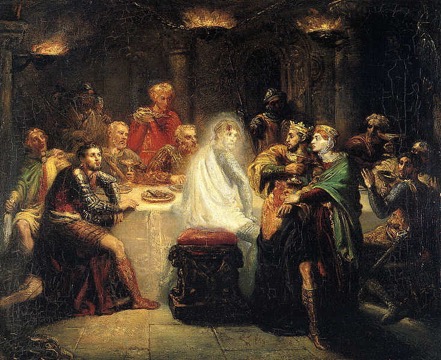
Théodore Chassériau, The Ghost of Banquo, 1855
" … what these Visitations seem to do to me. "
It seems to me that my departed friends never leave me for long. Once gone, they revisit, often at inconvenient times, apparently intent upon setting me onto a somewhat straighter path, for I meander on my way to pretty much everywhere. The shortest route between any two points seems utterly irrelevant to me, as I seem to insist upon usually taking some more scenic route. I set a goal then head off in another direction, my dereliction ranging behind me, weighing me down. These diversions even seem necessary, for if synchronicity is to have any chance of influencing me, it seems I must stray from any straight or narrow. My detours sometimes seem down right harrowing, for I often get lost in those woods. I seem to sometimes even abandon myself when straying, as if my underlying purpose in pursuing might have always been betraying myself. I end up lost, good and lost though it often feels bad and betrayed, as though I've cost myself my dream.
My departed friends tend to visit me then, when I'm feeling pretty near to absolutely dead-ended.
Experteasing

Left panel of the Dreux Budé triptych: the betrayal and arrest of Christ,
with the donors Dreux Budé and his son Jean presented by Saint Christopher by Master of Dreux Budé (circa 1450)
" … a place where few will ever suspect you of the sin of full expertise."
When I call for a refrigerator repair, I hope an expert (but not too much of an expert) will show up. I prefer working with an upwardly mobile journeyman rather than a full master. The full master's likely to be dismissive and perhaps denigrate me for abusing the appliance while the journeyman will still be inquisitive and learning, and more likely personable. Masters tend to be grumpy and filled with apparently irrelevant details, which they're anxious to share. I won't really want to learn the complete history of refrigeration, just enough information to get my machine working again. I'm even satisfied if the journeyman has to call back to the office for additional information. The expert who can complete the repair with his eyes closed scares me.
The problem with the experts in any field might be that they tend to scare the people with whom they interact.
ReOpeningUp
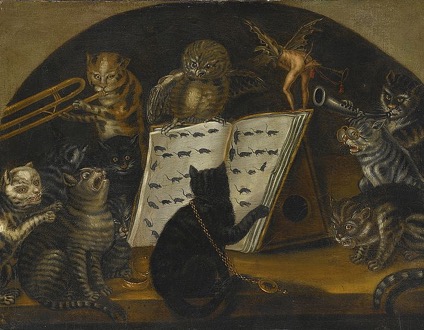
According to Sotheby's: Cats being instructed In the art of mouse-catching by an owl
Looks more like: A cat orchestra/choir directed by an owl, with sheet music made of little drawings of mice
Oil on canvas, circa 1700
"Yea, we can hear you now."
Each conflict seems to encounter its Midway Moment, an event that, while not fully resolving anything then, clearly presages an eventual outcome. I believe that this late July week just might have provided this cue. Though we're far from through with This Damned Pandemic, we seem to finally be taking it as seriously as it had been taking us for months and months. I see clear signs that we're no longer hawking bleach or hydroxychloroquine, and even Floridians and Texans seem humbled as their ICU beds fill to overflowing. Pandemics famously continue until. Until what is never obvious, but Damned Pandemics can be damned insistent, heartlessly continuing until we somehow catch on. Then we're playing catch-up for a long while. Few seem willing early on to trust mere knowledge or experience, and most want to rely upon their instincts, which have not yet evolved to fully understand the previously unexperienced challenge. We initially reject historical analogies as preposterous. We learn, painfully slowly, then we begin engineering a reckoning, a ReOpeningUp. Something seems to need to change within us before the changes we strive to engineer around us can come to anything but naught. This was the week that prefaced something different coming.
Extremism in pursuit of anything inevitably produces the opposite of its intention.
Backlisting

"Salvation visits, and the heavens open in blissful chorus …"
Back in the earlier days of this Damned Pandemic, shoppers became familiar with terms like Fragile Supply Chain, a concept every bit as interesting as Capital Asset Pricing Model or Unsecured Credit Default Swap, stuff the average Jane or Joe never found reason to care about until the National Toilet Paper Stockpile turned up empty seemingly overnight. We had come to think of toilet paper as an almost God-given right, by which I mean it had become the ultimate free good, given gratis in public restrooms everywhere without ever a thought to where it might come from. It turned out that there was a whole industry behind its production and distribution, that fairies hadn't just left the stuff within eternally easy reach. Shortages were possible, and we had no idea how we might ration the stuff. Many had never fully appreciated that the lowly toilet roll might have been a tacit centerpoint of their professional compensation package, for the employee "lounge" had never once attempted to charge for or ration the stuff, though rumor had it that the executive floor stocked a fluffier quality than did the John off the loading dock. Anyway, us consumers were shocked when we found empty shelves dominating the old TP aisle. Shortages quickly spread to the paper towel shelves, too, and we formerly privileged many were rudely introduced to the sort of austerity that hit us square in the shorts. Ouch!
Some shifted to online shopping, prompting an armada of brand new Amazon vans with their weird smiley face logo to begin rushing family-sized containers of this freshly precious stuff to every corner of the country.
LongDistance

" … a history where LongDistance briefly grew ever shorter before smartly snapping back closer to its traditional borders."
Geezers have always loved to tell stories about The Old Days, by which I mean the days when this world still seemed young to them. The later days, these days where geezers experience their ever advancing age, seem downright ancient in comparison, for they feature patterns grown far too familiar to frequently surprise or even delight, while back then, every new morning brought promise and discovery. Every generation believes that this world was produced for their delight and personal enlightenment. I remember doubting the existence of history then. How could history have been if I had not been included in it? I considered everything chronicled as having occurred before I was born to be a rumor, fiction created to cover up an obvious truth, that there could not possibly be a world without me being in it. Of course life eventually beat that notion out of me, once I'd started accumulating my own history for which many had not been present to witness. Aging eventually cures self-centeredness.
Horizons seemed to have broadened since then.
ChickenShit
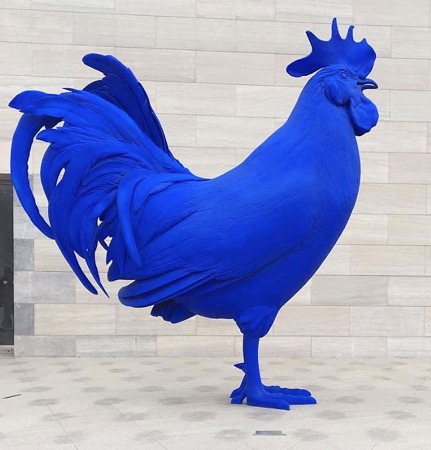
Katharina Fritsch, Hahn/Cock, 2013
"I cannot quite imagine a payoff or penalty worth the risk just yet."
Much of what tries to pass as information emanating from the current administration (which cannot seem to properly administer anything) bounces right off me. I can't care about crowd sizes or Our President's glowing self-assessments. I know they're all lies, and I'm not surprised or deeply troubled by them. He's a troubled man publicly wrestling with himself and largely losing. It's not really a fair fight. I mostly pity the poor guy, who by many accounts, never believed that he'd ever be elected into office and never really took to The White House. I understand that he'd really rather be golfing, a man his age, accustomed to big swindles and dedicated to never working very hard. He's arm candy gone stale and bitter, no longer really fit for public observation yet addicted to the stage. He seems to live in a dismissive rage now that he's the most powerful man in the world, or was before he started shedding power in favor of force which, of course, reliably backfired on him. Then he took to lying about our Damned Pandemic, obviously not even trying for a shred of truth, and I noticed that I noticed this and watched myself turn all ChickenShit.
ChickenShit's a Junior High word describing anyone unwilling to accept an unreasonable challenge.
AnEcologyOfUnknowability
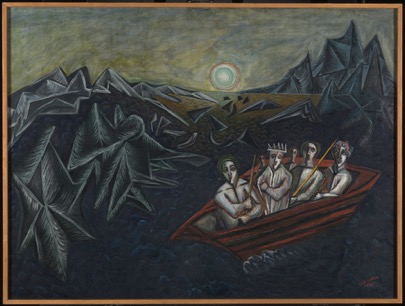
Cecil Collins, The Quest, 1938
"Our limitations denote the depth of our wisdom, not the breadth of our stupidity."
The unknowable seems to bedevil me. I do okay with the Known Knows, the Known Unknowns, and even with the Unknown Unknowns, for each of these categories still contain a presumption of potential knowability. My demons inhabit an orthogonal space which I cannot quite place on any known continuum, those defined by their tenacious unknowability. My ability to know serves no purpose there, for I could not possibly compare Unknowability's content to anything known or even anything distantly suspected, otherwise it might slip into some ultimately knowable classification. Some questions are nothing more than questions, posed, perhaps, not for answering resolution but to simply endlessly resonate. Who or what created the universe and when? What will next Tuesday bring? How many angels could actually dance on the head of this-here pin? We cannot even begin to know.
I can certainly pare down some mysteries, carve along margins to come to know a few details without ever actually addressing any fundamentally unknowable.
Gathering

The Ghent Altarpiece: The Adoration of the Mystic Lamb (interior view), painted 1432 by van Eyck
"They're well worth the occasional, exceptional, judicious risk …"
I reflected as we drove the narrow twisty road down into Boulder that I had not attended a Gathering of any sort in five full months. Focused upon sheltering in place, justifying going anyplace had become a negotiation, with just staying home usually winning the debate. Out, we became Covid invisible, proximity monitors on full alert, averted gazes taking the place of all human contact. We could move through as much of a crowd as an entry-controlled grocery store could offer without making a ripple, hardly noticing our own presence there before heading back to our altogether too familiar car which would as equally invisibly carry us back home and into isolation. But The Muse's first cousin's daughter Grace was holding a graduation recital up at their Boulder place, strict masking in place and to be held outdoors. The Muse's aunt would be there and the promise of a little family time drew us. I did not feel nearly as concerned as I expected to feel.
This was a genuine shindig attracting a crowd of perhaps sixty seated in lawn chairs across the broad front yard.
ConSpiriting

Youth of Moses, Alessandro di Mariano di Vanni Filipepi, known as Sandro Botticelli, circa 1481
" … some days, I even suspect myself."
Those in the know come to understand that everything's a conspiracy, and this might well be true. I gratefully live out of the know, largely unconnected, absent that conspiracy-minded spirit. I see ample evidence of a vast right wing conspiracy rooted way back in the Confederacy and dedicated to utterly undermining any threat of representative democracy encroaching on their autocracy. Most of us were certified under some form of neoliberal indoctrination, with "friendly" corporations funding special programs, even whole departments, at our so-called public universities. We come to hate commies, love Jesus, despise taxes, own guns, and distrust our own government. We weren't born wanting any of that. A conspiracy was probably behind it, but so what? So what?
ConSpiriting, that hounding sense that some deep dark conspiracy's actually behind most everything, cannot be disproven.
WarFooting
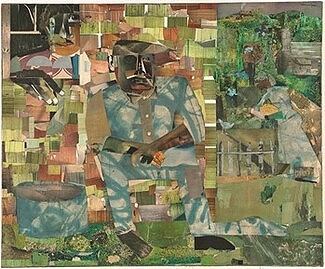
Romare Bearden: Tomorrow I May Be Far Away, 1967
"Lead us, please, into temptation and deliver us into the open arms of genuine evil, for we've come to revel in our supreme sense of invulnerability, for we are free! Free …"
Our enemies show us who we are, who we become when under extreme duress. Our friends reinforce for us who we intend to be, but our enemies goad us into showing who we're capable of being when we stop trying to please. We never placate or reassure our actual enemies, but seem to seek opportunities to highlight just how evil they must certainly be underneath. We give no quarter, we take no prisoners unless forced to, and then, only begrudgingly. We have demonstrated our willingness to bankrupt ourselves when we're on a WarFooting. Nothing's too expensive then, we'll mortgage the farm and the truck and the cow without hardly considering how we might one day repay the debt. When it's war, we conscript our sons, willingly wager our futures, and forget what we learned in the past. Nothing seems too dear and we inure ourselves to committing unspeakable acts for righteousness' sake. We conscript God and all religions to sanctify our necessary insanity. We are gratefully rarely publicly warring, for we've grown to understand that we can hide what's going on in those distant war zones by keeping the press out and lying to the public about what those invisible tussles might really be about. We have no stomach for war or for the truths it discloses to us about ourselves.
I can tell that we are not on a WarFooting where our Damned Pandemic's concerned.
Healing

Mediaeval tapestry illustrating bloodletting.
" … I'm satisfied with Healing from my latest attempt to heal myself."
I woke up this morning with a clear head for the first time in six months. The outset of the malady had somehow escaped my notice, for I was at that time filled with fresh promise. My Nurse-Practitioner had prescribed a fresh medication intended to counteract my high triglycerides level, a condition I inherited from my father and share with all my siblings. I had tried—honest, I'd tried—back during the cholesterol scare of the eighties, to find some way to combat this anomaly, but had surrendered when the prescribed medication was recalled as more dangerous than the impending disease. I'd taken to observing by far my favorite treatment, radical acceptance of the way things just seem to insist upon being. I figured, and probably not wrongly, that the state of the Healing arts had not then progressed to successfully treat what my father had only managed to unsuccessfully try to treat for the last half of his nearly eighty-five years. I'd concluded that my triglycerides were a feature and unlikely to encumber my life.
But my brother had told me about a prescription he'd started taking and my sisters chimed in that they'd begun this treatment, too, with promising results, so, though I was hardly convinced it would address my instance, I agreed to at least try it and see. I tried it and saw.
JustPracticing

Theodoor Rombouts: Allegory of the Five Senses, first half of the 17th Century.
"You're not actually going anywhere, anyway, JustPracticing."
When physicians ply their trade we say they're Practicing medicine. When surgeons work, we claim that they're performing. Since all surgeons are simultaneously physicians, are they Practicing when they perform? Our terms for engagement might misrepresent the nature of engagement. Are truck drivers performing a service or practicing a skill in which they've yet to achieve full proficiency? I might expect flawless service from a performing practitioner but accept a few flaws from a Practicing one. The very term practitioner suggests someone practicing, the skilled practitioner supposedly the more experienced at Practicing rather than performing. Practicing, as anyone stuck with a clarinet in 4th grade understands, does not necessarily translate into immediate or even eventual perfection. One might become much more skilled at Practicing than they ever become at performing, as every garage band member can attest. And it might well be that every performance serves as a simple extension of Practicing, albeit in some different context. Singing in the shower might prepare someone to perform on a stage, but the situations hardly compare.
Practicing seems necessary but not predictive.
Memento Mori
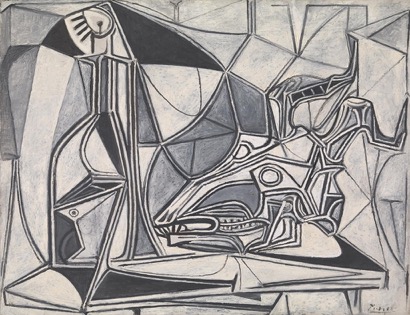
Pablo Picasso, Goat’s Skull, Bottle and Candle, 1952
Memento mori: an artwork designed to remind the viewer of their mortality and of the shortness and fragility of human life.
"Plagues only seem interminable. Life remains short."
Not to wax too finely over the obvious, but The Damned Pandemic strikes me as an enormous Memento Mori. It hovers as an annoyingly continuous reminder of the proximity of morbidity, mortality, and tragedy. Threat hovering over an Eat, Drink, and Be Merry Culture so recently dedicated to ignoring these inescapable elements of existence. Excuse us, please, if we all of a sudden seem unusually pissy. I've noticed myself complaining more but curiously enjoying it much less. I never became an actual habitual complainer, thinking the practice generally unseemly, but I readily admit to finding some welcome solace in the practice, if only occasionally. My complaints seem to work like a capacitor, slowly building a charge before releasing it in a quick discharge, seemingly coming from absolutely nowhere. I'm a smoldering, slow-burn sort of guy, rarely belying my steady countenance until already over some edge. Curiously, I usually feel much better after an outburst, as if most of the cure for my complaint came from simply airing it. An ounce of finding somebody to whine to might be worth a pound of any other cure.
Now, we only have each other to whine to and we each suffer from precisely the same complaint.
'Stitions
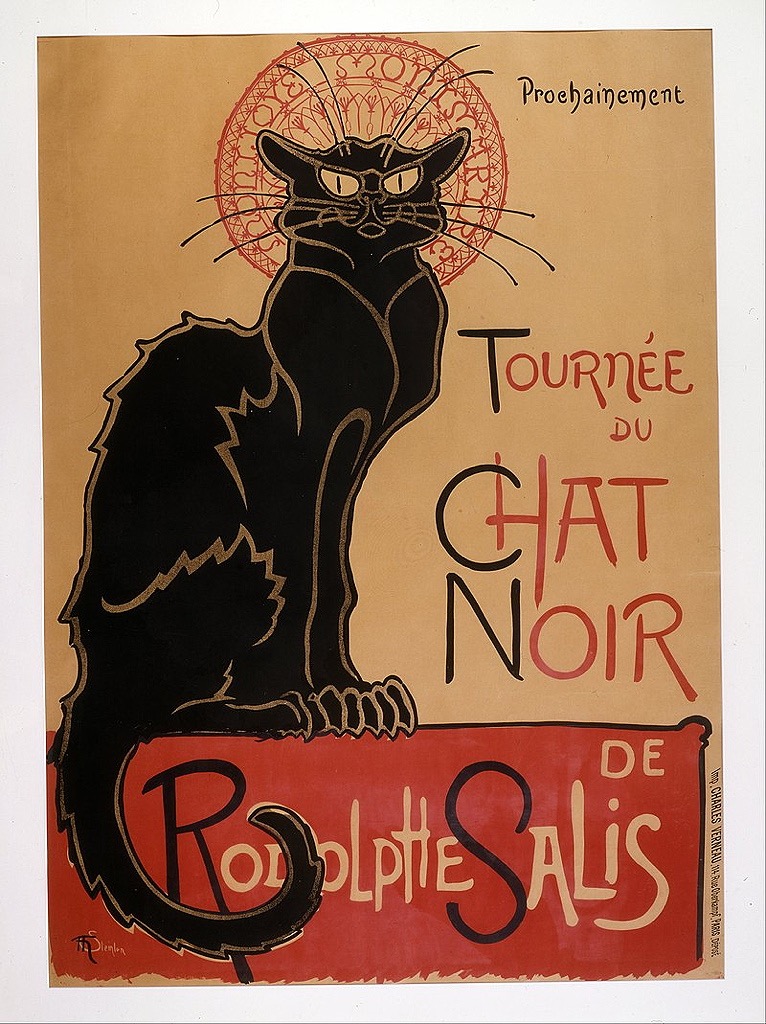
Théophile Steinlen's 1896 poster advertising a tour to other cities ("coming soon") of Le Chat Noir's troupe of cabaret entertainers
"Evil might even appreciate my diligence whenever I remember to keep it at bay."
I consider myself minor-stitious rather than superstitious. This designation means that I maintain more awareness than belief. I certainly do notice when a black cat crosses my path, remain scrupulous about not walking beneath open ladders, and appreciate parking karma when it visits me, but I do not go into hiding at the drop of a black cat, open ladder, or when forced to park a quarter mile away from my destination. I believe it healthy for a modern such as myself to retain a taste for lore from the past, not to the point of foraging for newt eyes or keeping a caldron simmering, but to show respect for my ancient elders. I feel confident believing that a few of my direct ancestors believed in witches, for they were Puritans, and Puritans believed such things. I feel confident that a few of my more firmly held beliefs will have been shown up as mere superstitions four hundred years hence, for that's just something futures seem destined to do to our practices, particularly the more sacred ones. I acknowledge my primitive sides, even though they might presently mostly hide from my sight.
Many of my 'stitions stem from my relationship with synchronicity, that sometimes sense that destiny's discovered me by means of the apparently happy accident.
Slipstems
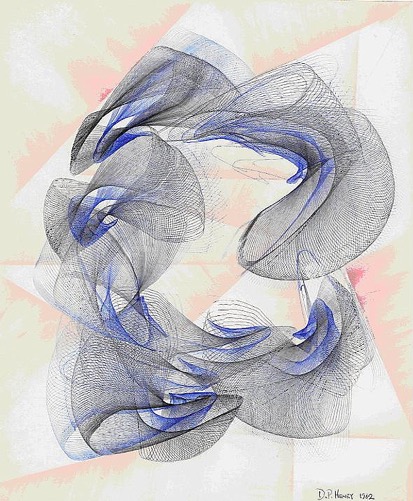
Picture by Drawing Machine 1, c. 1960
"I type with one hesitant finger regardless of the keypad."
We now possess what we firmly believe to be a well-developed understanding of systems. It's systems this and systems that, everything spoken of in systemic terms. I, myself, sometimes seem little more than a minor node within some vast collection of interrelated nodes, probably contributing some essential element to achieving some unknowable. We have ample systems where the leg bone's quite obviously connected to the hip bone, and innumerable essentially unconceivable systems where mysterious viruses invade in mysterious ways. We do not seem to have a well-developed theory of unconceivable systems, though, other than to complain about so-and-so seeming to not be much of a systems thinker, and I think we suffer under this absence. I refer to these mysterious systems as Slipstems, for their subtleties seem to slip right by us. We perceive them as materially different from what they might actually be, and behave accordingly, coping poorly with the resulting feedback.
I think of systems as unforgiving monsters tamed only by understanding.
Feckonomics
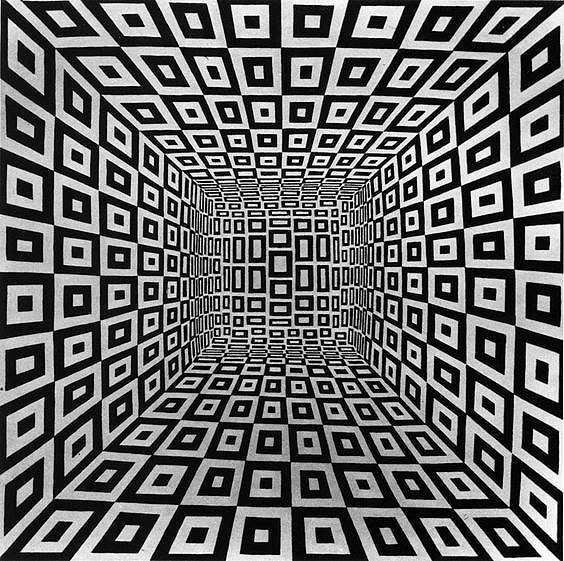
Richard Anuszkiewicz, Knowledge and Disappearance, 1961
"Human agency becomes evidence of absent fealty and simple want, a grave moral shortcoming."
Economics seems the most feckless profession, one largely populated with avowed blind men endlessly arguing over the nature of an imaginary elephant before them. Each wears the spectacles acquired through their religious conversion into one school or another, the sorts of schools more focused upon indoctrination than studied observation. One might claim to be of the Austrian School, an aristocratic pedigree, indeed. Another might have sworn fealty to Keynes, a mighty systems thinker who never actually settled into any particular insistence. The Behaviorists have become increasingly popular, though they fancy themselves as insurgents not aspiring to prominence within the profession. Supply-siders, rarer than exotic hen's teeth following their 2008 financial system debacle, executed a come back on the backs of whacky, self-espousing conservative Christian law breakers, only to systematically organize another feckless pilfering of the public purse for parochial allocation. It seems that only the depth and color of conviction separates these schools, each in turn becoming the favored idiot step-child of some ignorant administration.
However wise and well-informed any individual economist might have proven him/herself to be, their philosophy only ever finds utility when associated with some administration's policies, and those policies are largely framed by folks with much less understanding and perhaps even greater religious conviction than any individual practitioner.
Bitchuals

Priests of Anubis, perform the opening of the mouth ritual; illustration from the Book of the Dead of Hunefer
"I have no idea who I'd be without them hectoring me."
I tell myself that I maintain my many rituals to retain my sanity, but truth told, they occasionally drive me crazy. I maintain many rituals, for I seem to be one of those beings more attuned to rhythms than melodies or rhymes. I hold an extreme sensitivity to timing, and sense in what sequences I should engage. I meditate before breakfast, never after, and insist upon fasting until after I've finished my morning writing. My doctor prescribed a pill I'm supposed to swallow a half-hour before breakfast, which disrupts my usual sequence of rituals, delaying breakfast until seemingly much later, so I can throw in my morning shaving and showering ritual before I eat. I fairly religiously maintain these little engagements, inevitably in precisely the same sequence, until long after I hear myself starting to complain about them. They sometimes seem more habitual than actual ritual, only occasionally inducing any increased mindfulness. I confess to complaining about them to myself, as if I'd been cursed with them rather than them having once been freely chosen. I might best explain them as Bitchuals now, rituals where the underlying incantation has become subvocalized complaint. I bitch to myself about 'having' to perform them.
I wouldn't trade my Bitchuals for the world and most of its charms, for it seems I'll come to harm should I disrupt my sacredly profane routine.
Behinder
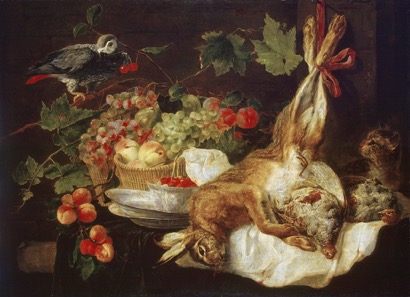
Hare, Fruit and Parrot, Jan Fyt (Fijt), Flanders, 1647
"The hurrier I go, the behinder I get." -Lewis Carroll
Our society behaves like a still life painting aspiring to become a Walt Disney movie. Directed to stand down, we commence to running around as if simply sitting still might kill us. We had formerly proven ourselves to be an impatient lot with hungry eyes, sprinting into our future, prone to act first and think later, if ever, so I should not feel in the least bit surprised at our latest antics. Certainly some seem fully capable of simply sitting with themselves, alone with their existence, but generations cultured as Mall Rats seem more than hesitant to abandon their once reliable ship. Days off were often seen as excuses to get out and do something, and any urge to stay at home, evidence of some underlying social malady. We became public beings without apparent private life, sharing what would have once been seen as personal secrets with loosely organized audiences composed of more or less equally imperfect strangers, bound by our compulsions.
How, the pundits wonder, did the You Ess of A become the centerpiece in this latest piece of performance art?
TheSphericalCow
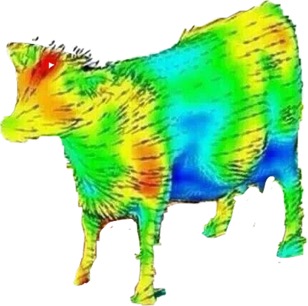
"The scientist trains to understand how to propose and then let go of naive initial assumptions."
Theoretical Physicists seem to forever resort to a mythical Spherical Cow when attempting to analyze some natural phenomenon. Let's say, for instance, that said physicist wanted to consider the aerodynamics of a cow. (This sort of problem rarely comes up for consideration in the careers of chartered accountants. This might be the best reason to avoid a career in chartered accountancy.) Rather than first include all the variations a cow's body shape might add to the initial calculation, the canny physicists will employ a bit of fiction and first assume a Perfectly Spherical Cow, an utter absurdity. Given this regular shape, general principles might be easily identified to produce a rough first draft of a solution. Later, our physicist can add complications like legs, horns, hooves, and head, to iteratively produce more real world assessments. First pass assessments frequently rely upon a mythical Spherical Cow.
Much science advances in a similar fashion, building upon some deliberate fiction when first attempting to understand some phenomena.
HeatWave

Die Kornernte (The Harvesters), Pieter Bruegel der Ältere (Peter Bruegel The Elder), 1565
"I cannot capture these dehydrated days for reconstitution later this year."
The petunias have finally come into their own, thirsty every other day. Those plants not yet convinced that it's actually summer probably won't amount to much this year. The deck fountain loses an inch to evaporation overnight and will need refilling by tomorrow. The yard crunches underfoot, though the grass still looks green. Everything dries from the bottom up, the soil losing moisture faster than does the foliage. I'm on watch, wary of another huge water bill, I become stingy and careful. The air feels so dry that I wake up unable to swallow, my throat desiccated overnight to the texture of dry rubber. The air feels lighter than air. A cloud tries to drop rain, but its moisture can't quite make it to the ground and leaves nothing but a smear along the far horizon. Deer graze through the neighbor's garden, pruning plants they usually avoid. I prefer a shady spot these mornings while the world awakens to face a HeatWave.
By what magic has that winter become summer? I missed the transition.
ParodyProductions
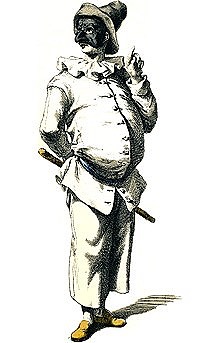
Book illustration of Pulcinella in 1700 (1860) by Maurice Sand
" … we're each seemingly blessed with this bottomless ability …"
My first enlightenment came with a frightening realization. I really felt as though I had been successfully passing for what I deeply felt I simply had to be. I caught myself behaving as the self I'd convinced myself I simply had to be, and I, in that moment, saw right through my flimsy facade. I felt in that humbling moment, deeply ashamed at how I'd managed to game myself into that condition. I felt deep contrition, but had yet to understand who else I might pass myself off as being. I had known almost forever that nobody would ever accept the me I once knew to be most representative of myself, that I could publicly be anyone else, but never myself, one Hell of a deeply false premise. And so had begun my first and probably greatest ParodyProduction of my life. I've been living down that performance ever since.
A parody begins with a slightly twisted premise and over time tends to turn into a really bad episode of The I Love Lucy Show.
SelfDeflection
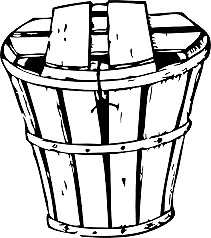
"Maybe we can't afford to know any different …"
In this neighborhood, almost everyone comes and goes through their garage door. As a car approaches home, the door opens via remote control, the car enters, and the inhabitant exits their car inside as the garage door slides back closed. This pattern limits opportunities for interacting with neighbors. Indeed, it limits one's ability to ever even meet a neighbor. We live adjacent but largely anonymously. I see the joggers and dog walkers without usually knowing which garage door they live behind. Once buttoned up at home, most people live looking out the back of their houses, where the hillsides provides views. The front yards, dominated by the driveway, might receive little but modest attention and even less traffic. Further, covenants limit the range of potential individuation allowed by each homeowner. Colors must conform to a narrow palate and even plantings, to consistent guidelines. I just this week, while out looking at the twilit sky, met a neighbor who lives just five doors up the street. She'd been living there since long before The Muse and I moved in five years ago. We'd never seen or met each other before.
This lifestyle seems like a form of SelfDeflection to me.
InterdependenceDay
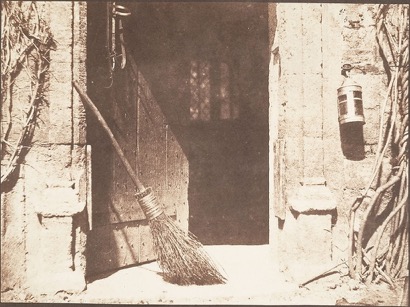
William Henry Fox Talbot, The Open Door, before May 1844
"Living free means living interdependently …"
Our kittens Max and Molly behave as if they'd rather I maintained an open door policy, for they feign fierce independence. They're apt to slip by me when I'm carting supper out onto the deck, though I'm more likely to accidently-on-purpose let them slip by me. They gleefully head for the stairway down to the backyard, where they munch long grass fronds —to later barf back up with their supper, which I will dutifully clean up without complaint—, cultivate garden beds, and roll around in the dirt before stealthily stalking birds they could not possibly catch. An hour or less later, and their independent spirit lags. Molly lies near the top of the stairs staring off into the distance while Max maintains his resistance, perhaps by climbing a tree. A shake of the kitty treats package brings them both fleeing back into accustomed dependency, though they shortly start sniffing and mewling around the door again, hoping to regain their independence.
Sometimes, Molly will escape and stay away for a day or longer, but eventually she'll return, contrite, looking as if she might appreciate a square meal.
SelfReferencer
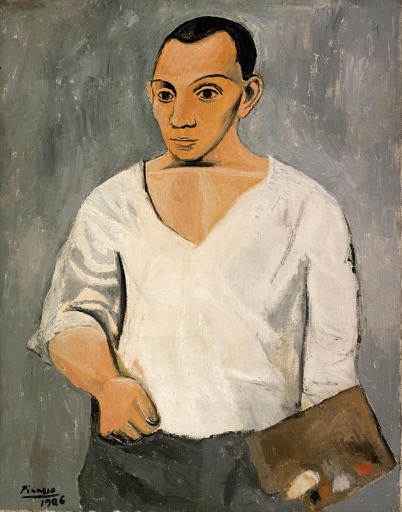
Pablo Picasso, Self-portrait with Palette, 1906
"I admit that I can usually see little further than my own nose …"
All literature seems inescapably self-referential, each work essentially self portraiture. That seems the sort of opening sentence certain to ward off all but the very most dedicated and/or delusional readers, for few want to experience another snake eating his own tail. Us readers want stories, and we're much less picky than we probably should be about where those stories come from or really what they're about. Stories can sooth readers into a supreme sense of self-control, elevating each into the role of almost omniscient observer and judge. After all, we're privy to what the protagonist thinks, his internal monologues, in ways we might not ever personally experience when observing ourselves. My internal dialogues only occasionally and perhaps accidentally distill into anything definite, and, as my dedicated Repeat Offender readers can attest, they often never reach any definitive conclusion. I roll around in my world like a wet dog on a recently clean carpet.
I have been over the past couple of weeks, working with my Genius Nephew to attempt to distill what I'm doing with my writing.
HardWork
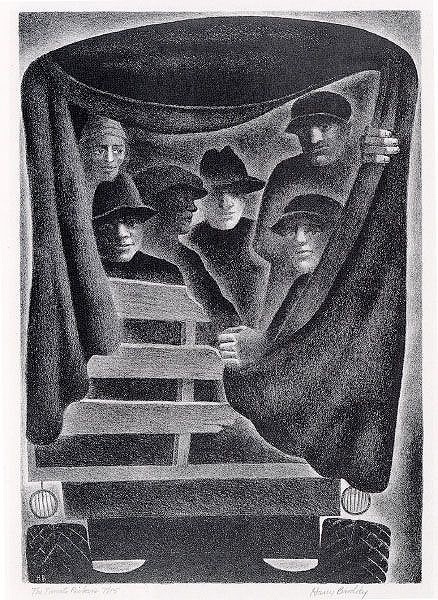
Harry Brodsky, Tomato Pickers, 1938
"It's always a fundamentally unfair fight …"
All insistences that we're a HardWorking people aside, I'd rather not have to work that hard. I'd feel a member of a minority if I didn't look around me. As my brother used to ask, "You working hard or hardly working?" My honest response would be that I was hardly working. I feel fortunate to have found so-called work that seems more calling than indenture, so even engaging long hours in it hardly feels much like working. I believe that even clever Yankees found ways to leave their Pilgrim forebears' HardWork behind, creating passive income streams to replace brow sweat and aching backs. Few seem to aspire to careers solely consisting of HardWork, but most might consent to a period of it in the firm belief that they'll eventually graduate to become one of those shiny-seated suits hardly working in the front office.
Still, some HardWork remains.
Educations
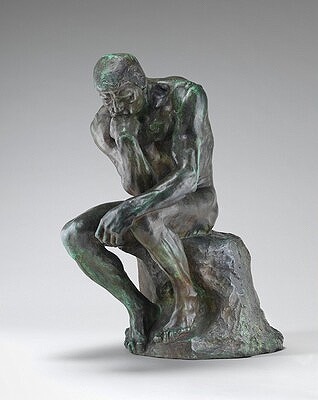
The Thinker (Le Penseur) by Auguste Rodin, model 1880, cast 1901
"It's pass/fail."
I learned more on my before and after school jobs than I ever learned in any classroom. I began as an intimidated student. Who wouldn't be, with the institution surrounding me? I later learned to become more enthusiastic, but I watched that enthusiasm leach out of me as I learned how the game was played. Even the well-meaning teachers expected me to memorize and test well, to diligently study (without once demonstrating what that entailed in a home with endless distractions), and to learn. I seemed more dedicated to preserving what I understood, defending that against threatening onslaughts ranging from math to science to foreign languages. I had no clear image of who I might become should I successfully assimilate all that orthogonal information, so I chose to hold onto what I had rather than abandon myself in favor of learning how to become anybody else. At work, I pretty quickly learned what I needed to do to thrive. School mostly taught me how to hide out until the serial assaults on my identity ceased.
The process of education deeply offended me.


